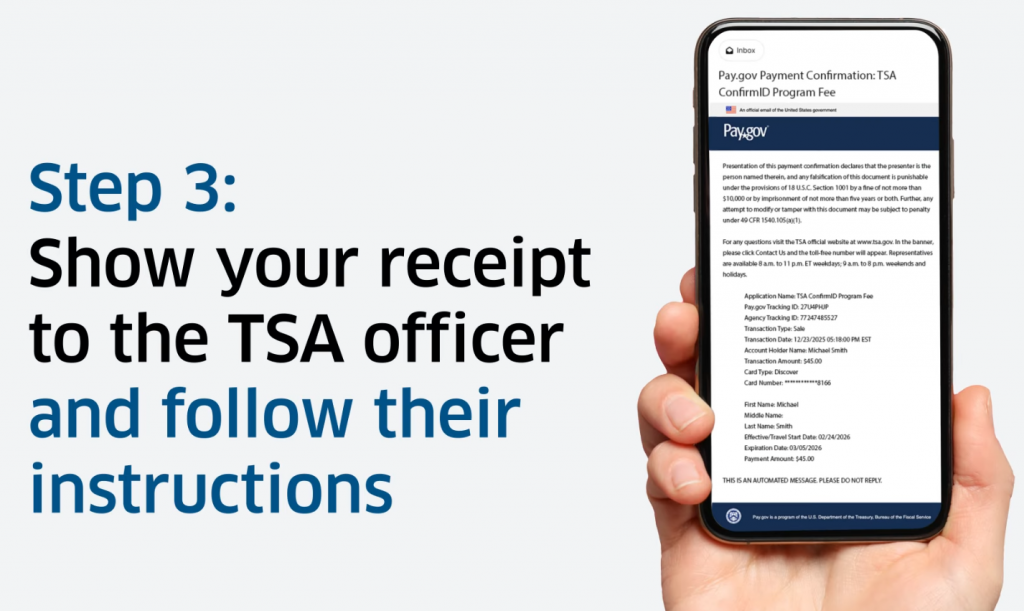
Today the TSA launched a flagrantly illegal new extortion program, TSA ConfirmID, to collect $45 from each airline passenger who wants to fly without showing REAL-ID.
As of today, only the payment platform for this “ID verification” program is operational. If you want to fly without REAL-ID on or after February 1, 2026, a new TSA video instructs you to pay $45 each through the Pay.gov website, bring your receipt to the TSA checkpoint at the airport, “show your receipt to the TSA officer and follow their instructions”.
Payments are accepted by ACH transfer from a bank account, credit or debit card, Venmo, or PayPal.
What will the TSA officer instruct you to do at the checkpoint? The TSA says that:
TSA will then attempt to verify your identity so you can go through security; however, there is no guarantee TSA can do so. Please note: Using TSA ConfirmID is optional. If you choose not to use it and don’t have an acceptable ID, you may not be allowed through security and may miss your flight.
The TSA says that you “may” not be allowed through the checkpoint, not that you “will” not. And the TSA’s FAQ says that, “In the event you arrive at the airport without acceptable identification (whether lost, stolen, or otherwise), you may still be allowed to fly”.
What are the procedures for this “attempt to verify your identity”? What are the criteria for whether or not the TSA will allow you to fly? We don’t know.
A TSA propaganda video released last week falsely claims that, “Everyone knows that when you fly you have to bring a REAL-ID or a passport.” In fact, 200,000 people a day fly without REAL-ID and without a passport. (Any passport of any country is considered REAL-ID.)
It’s unclear what will happen to travelers who show up at TSA checkpoints on February 1st without REAL-ID, or with no ID at all, whether or not they have paid the $45 per person “TSA ConfirmID” fee. See our FAQ about your rights and what might happen.
As we pointed out when the TSA announced this plan in December, no law authorizes this scheme. No law requires airline passengers to have, carry, or show any ID — as the TSA itself has consistently argued, at least to date, when the issue has been raised in court.
The TSA has promulgated no regulations for “TSA ConfirmID”, has published no Privacy Act notice for the information collected from travelers either when they pay the $45 fee or when they go through the TSA checkpoint, and has neither requested nor received approval from the Office of Management and Budget (OMB) for this collection of information, as is required by the Paperwork Reduction Act (PRA).
“TSA ConfirmID” isn’t mentioned in any of the Privacy Act notices for the TSA’s systems of records. Operation of a system of records by a Federal agency without first publishing a proper notice in the Federal Register is a criminal violation of the Privacy Act on the part of the responsible agency employees:
Any officer or employee of any agency who willfully maintains a system of records without meeting the notice requirements of subsection (e)(4) of this section shall be guilty of a misdemeanor and fined not more than $5,000.
Presumably, data collected from individuals who pay the $45 “TSA ConfirmID” fee is passed on to the TSA and stored in some (undisclosed) TSA system of records. The TSA officers and employees responsible for that system of records are, as of today, criminals.
Even the payment platform for the $45 fee is in flagrant violation of multiple Federal laws. The Pay.gov payment site and TSA ConfirmID payment form display no OMB control number, as is required by the PRA.
The Department of the Treasury, which operates Pay.gov, says specifically that:
An agency may not conduct or sponsor, and a person is not required to respond to, a collection of information unless it provides notice of a currently valid Office of Management and Budget (OMB) control number. Among other things, a notice of the expected time burden is required…. Pay.gov provides services to Federal agencies. These services include the posting of agency forms. Required notices that accompany these forms are the responsibility of those agencies.
There’s a link from the payment page to a Privacy and Security Policy, but the linked page doesn’t mention the Privacy Act, the PRA, or an OMB control number.
Since the TSA hasn’t chosen to follow the law or disclose any of its plans, the only way to figure out the de facto “rules” is to reverse engineer them from travelers’ experiences.
If you show up at a TSA checkpoint on or after February 1st without REAL-ID, or with no ID, please let us know whether or not you paid the “TSA ConfirmID fee” and what happened to you at the cehckpoint..
Keep a copy and/or take a photo or screenshot or any printed or online forms you are asked to fill out. If the forms or user interface pages don’t include a valid OMB control number, you can legally ignore them without penalty.
Are you allowed to fly without REAL-ID? With no ID? Without paying the “TSA ConfirmID” fee? If you are prevented from flying, who stops you? What do they say is the basis for their action?
You have the right to film and record at TSA checkpoints. Please share your experiences so we can better inform future flyers without ID or without REAL-ID.


